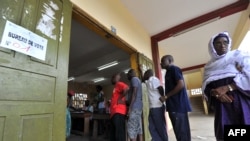Voters in Ivory Coast began casting their ballots in local elections Sunday, amid high tensions following a boycott of the polls by the party of former president Laurent Gbagbo.
They are the first local elections in more than a decade in French-speaking West Africa's largest economy and the first time the government has organized a vote since a disputed presidential contest in 2010 plunged the country into violence.
Almost 700 candidates are running for municipal seats, with an additional 84 on the ballot for regional positions.
With Gbagbo's party, the Popular Ivorian Front (FPI), out of the race, the election is a contest between the two parties in power -- President Alassane Ouattara's Rally of Republicans and the Democratic Party of Ivory Coast.
The FPI has demanded that authorities reform the electoral commission and grant an amnesty for crimes committed during the 2010-11 election crisis.
The United Nations estimates that at least 3,000 people died in five months of fighting after Gbagbo refused to concede defeat to the winner and current president, Ouattara.
The final days of the campaign saw clashes in several areas including Abidjan and towns in the west, an unstable, violence-prone region.
They are the first local elections in more than a decade in French-speaking West Africa's largest economy and the first time the government has organized a vote since a disputed presidential contest in 2010 plunged the country into violence.
Almost 700 candidates are running for municipal seats, with an additional 84 on the ballot for regional positions.
With Gbagbo's party, the Popular Ivorian Front (FPI), out of the race, the election is a contest between the two parties in power -- President Alassane Ouattara's Rally of Republicans and the Democratic Party of Ivory Coast.
The FPI has demanded that authorities reform the electoral commission and grant an amnesty for crimes committed during the 2010-11 election crisis.
The United Nations estimates that at least 3,000 people died in five months of fighting after Gbagbo refused to concede defeat to the winner and current president, Ouattara.
The final days of the campaign saw clashes in several areas including Abidjan and towns in the west, an unstable, violence-prone region.
Some information for this report was provided by AFP.







